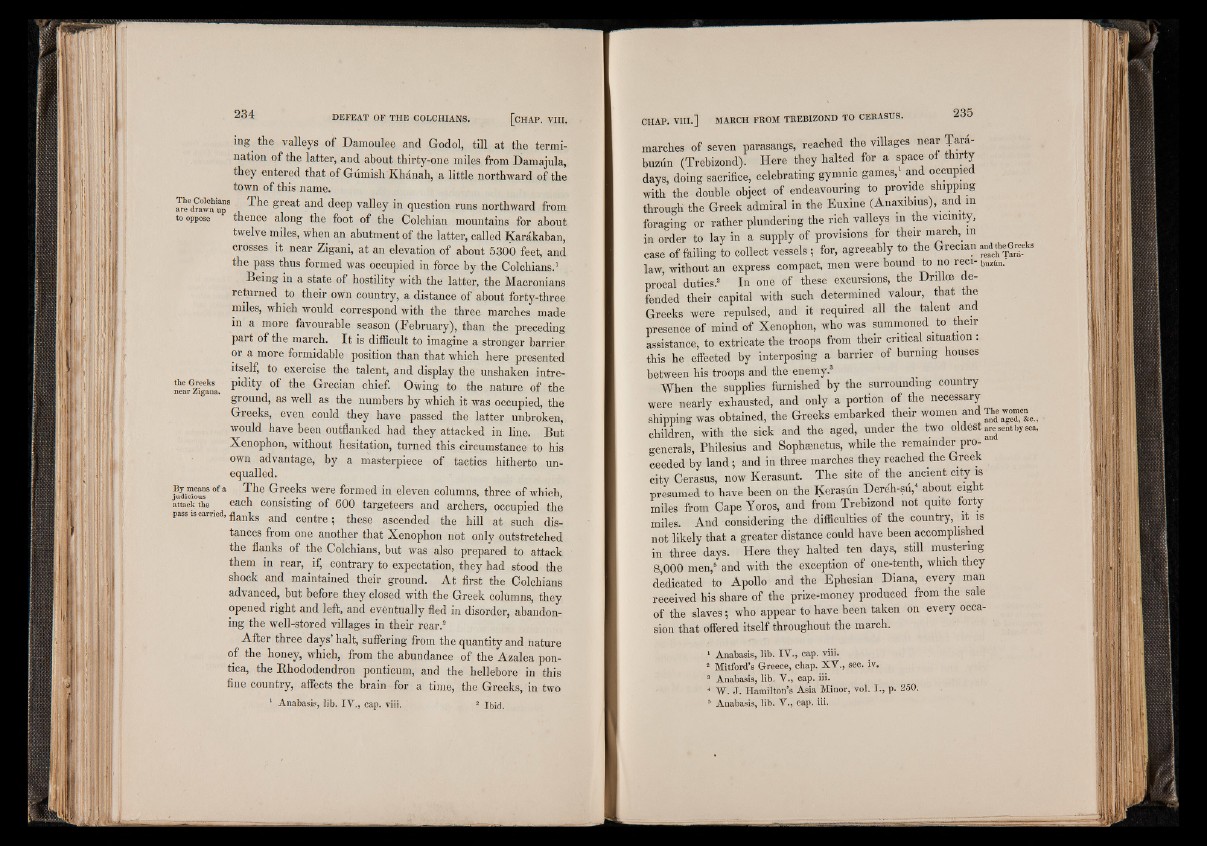
ing the valleys of Damoulee and Godol, till at the termination
of the latter, and about thirty-one miles from Damajula,
they entered that of Gumish Khanah, a little northward of the
town of this name.
are^rawu1^ 8 ®reat and deeP valley in question runs northward from
to oppose thence along the foot of the Colchian mountains for about
twelve miles, when an abutment of the latter, called Karakaban,
crosses it near Zigani, at an elevation of about 5 3 0 0 feet, and
the pass thus formed was occupied in force by the Colehians.1
Being in a state of hostility with the latter, the Macronians
returned to their own country, a distance of about forty-three
miles, which would correspond with the three marches made
in a more favourable season (February), than the preceding
part of the march. It is difficult to imagine a stronger barrier
or a more formidable position than that which here presented
itself, to exercise the talent, and display the unshaken intre-
nel“ a. pidity °f the Grecian chief. Owing to the nature of the
ground, as well as the numbers by which it was occupied, the
Greeks, even could they have passed the latter unbroken,
would have been outflanked had they attacked in line. But
Xenophon, without hesitation, turned this circumstance to his
own advantage, by a masterpiece of tactics hitherto unequalled.
®di“ous8°fa T te Greeks were formed in eleven columns, three of which,
attack t t e each consisting of 6 0 0 targeteers and archers, occupied the
pass*carried,flanks and centre; these ascended the hill at such distances
from one another that Xenophon not only outstretched
the flanks of the Colehians, but was also prepared to attack
them in rear, if, contrary to expectation, they had stood the
shock and maintained their ground. At first the Colehians
advanced, but before they closed with the Greek columns, they
opened right and left, and eventually fled in disorder, abandoning
the well-stored villages in their rear.8
After three days’ halt, suffering from the quantity and nature
of the honey, which, from the abundance of the Azalea pon-
tica, the Rhododendron ponticum, and the hellebore in this
fine country, affects the brain for a time, the Greeks, in two
1 Anabasis, lib. IV ., cap. viii. 8 ibid.
marches of seven parasangs, reached the villages near Tara-
buzun (Trebizond). Here they halted for a space of thirty
days, doing sacrifice, celebrating gymnic games,1 and occupied
with the double object of endeavouring to provide shipping
through the Greek admiral in the Euxme (Ana,xibius), and in
foraging or rather plundering the rich valleys m the vicinity,
in order to lay in a supply of provisions for their march, m
case of failing to collect vessels; for, agreeably ' ^ reacb Taralaw,
without an express compact, men were bound to no reci- buziin;
procal duties.2 In one of these excursions, the Drill® defended
their capital with such determined valour, that the
Greeks were repulsed, and it required all the talent and
presence of mind of Xenophon, who was summoned to their
assistance, to extricate the troops from their critical situation :
this he effected by interposing a barrier of burning houses
between his troops and the enemy.3
When the supplies furnished by the surrounding country
were nearly exhausted, and only a portion of the necessary
shipping was obtained, the Greeks embarked their w o m e n and The
children, with the sick and the aged, under the two oldest are sent by sea,
generals, Philesius and Sophaenetus, while the remainder proceeded
by land; and in three marches they reached the Greek
city Cerasus, now Kerasunt. The site of the ancient city is
presumed to have been on the Kerasiin Dereh-su,4 about eight
miles from Cape Yoros, and from Trebizond not quite forty
miles. And considering the difficulties of the country, .it is
not likely that a greater distance could have been accomplished
in three days. Here they halted ten days, still mustering
8,000 men,5 and with the exception of one-tenth, which they
dedicated to Apollo and the Ephesian Diana, every man
received his share of the prize-money produced from the sale
of the slaves; who appear to have been taken on every occasion
that offered itself throughout the march.
1 Anabasis, lib. IV ., cap. viii.
! Mitford’s Greece, chap. X V ., sec. iv.
3 Anabasis, lib. V., cap. iii.
4 W. J . Hamilton’s Asia Minor, vol. I ., p. 250.
5 Anabasis, lib. V., cap. iii.